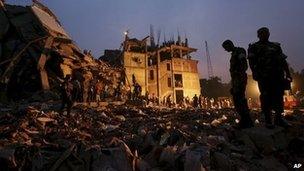Dhaka building collapse: EU considering action
- Published

The European Union has said that it is considering "appropriate action" to encourage an improvement in working conditions in Bangladesh factories.
It said its actions may include the use of its trade preference system, which gives Bangladesh duty- and quota-free access to EU markets.
The move comes after at least 382 people died when a factory collapsed on the outskirts of Dhaka last week.
The EU said it was "very concerned" about labour conditions in Bangladesh.
"The EU is presently considering appropriate action, including through the Generalised System of Preferences (GSP)... in order to incentivise responsible management of supply chains involving developing countries," EU foreign policy chief Catherine Ashton and Trade Commissioner Karel de Gucht said in a statement.
The disaster has provoked worldwide calls for an improvement in conditions for workers supplying the garment trade.
Retailers in Canada have agreed to develop a new set of trade guidelines.
Meanwhile clothing store chain Primark has said that it will pay compensation and offer emergency food aid to victims of the factory collapse who worked for its supplier.
Scale becoming clear
The building's owner, Mohammed Sohel Rana, has been arrested by the police.
His assets, as well as those of the owners of five factories which operated there, have been frozen.
They face allegations of negligence, illegal construction and persuading workers to enter the building, a day after visible cracks appeared.
Two engineers who reportedly approved the safety of the structure have also been detained.
Hundreds of people are still missing, with local media reporting that more than 100 families are still waiting to learn the fate of relatives who were working in the building last Wednesday.
The EU officials said they were deeply saddened by the "terrible loss of life".
"The sheer scale of this disaster and the alleged criminality around the building's construction is finally becoming clear to the world," they added.
Police clashes
Bangladesh has one of the largest garment industries in the world, with the sector making up almost 80% of the country's annual exports.
The industry provides employment to about four million people and is a key contributor to the Bangladesh economy.
However, it has faced criticism over low pay and limited rights given to workers, and for the often dangerous working conditions in factories.
In November, a fire at a garment factory in a Dhaka suburb resulted in the death of at least 110 people.
On Tuesday, hundreds of garment factory workers held protests in several industrial areas on the outskirts of Dhaka against the latest building collapse and demanded the death penalty for the owner of the building.
The protests later turned violent and a number of vehicles were damaged. Police used batons to break up the crowds.
Fearing further violence, many garment factories in industrial suburbs were also shut.